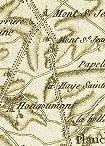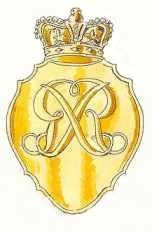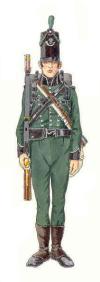| Accueil
Annuaire
Faits et événements
Personnages
Napoléon
La France et le Monde
Waterloo
Belgique
Armées
Uniformes
Reconstitution
Publications
Liens
Nouvelles du Jour
Plan du site
Balises


|
.
| |
Line
Infantry |
|
|
|
| |
L'armée britannique
alignait à Waterloo 13 bataillons d'infanterie de ligne (distincts
des Guards, de l'infanterie légère
et des Highlanders). Ces bataillons (ou régiments) ne présentent
entre eux de différences qu'au point de vue de la couleur distinctive
et du galonnage des boutonnières (à quelques exceptions près).
En 1815, l'infanterie
britannique comptait 104 régiments d'infanterie de ligne (régiments
of foot), numérotés de 1 à 104. Sur ce nombre, 6 étaient d'infanterie
légère. En outre, le 95e et le 5e bataillon du 60e régiment étaient
des riflemen (carabiniers).
|
|
|
|
| |
Les régiments suivants
se trouvaient en Belgique en juin 1815 :
* 1st (or the Royal Scots) regiment
of foot (3e bataillon)
* 4th (the King’s Own) regiment of foot (1er bataillon)
* 14th (Buckinghamshire) regiment of foot (3e bataillon)
* 23rd (the Royal Welsh Fusileers) regiment of foot (1er bataillon)
25th (the King's Own Borderers) regiment of foot (2e bataillon)
* 27th (Inniskillings) regiment of foot
(1er bataillon)
* 28th (North Gloucestershire) regiment
of foot (1er bataillon)
* 30th (Cambridgeshire) regiment of foot (2e bataillon)
* 32nd (Cornwall) regiment of foot (1er
bataillon)
* 33rd (1st Yorkshire West Riding) regiment of foot (1er bataillon)
35th (Sussex) regiment of foot (2e bataillon)
37th (North Hampshire) regiment of foot (2e bataillon)
* 40th (2nd Somersetshire) regiment of foot
(1er bataillon)
* 42nd (Royal Highland) regiment of foot (1er bataillon)
* 44th (East Essex) regiment of foot (2e bataillon)
* 51st (2nd Yorkshire West Riding) (light infantry) (1er bataillon)
* 52nd (Oxfordshire) rgt of foot (light infantry) (1er bataillon)
54th (West Norfolk) regiment of foot (1er bataillon)
59th (2nd Nottinghamshire) regiment of foot (2e bataillon)
* 69th (South Lincolnshire) regiment of foot (2e bataillon)
* 71st (Highland) regiment of foot (light
infantry) (1er bataillon)
* 73rd (Highland) regiment of foot (2e bataillon)
78th (Highlanders Ross-Shire Buffs) regiment of
foot (2e bataillon)
* 79th (Cameron Highlanders) regiment
of foot (1er bataillon)
81st regiment of foot (2e bataillon)
91st regiment of foot (1er bataillon)
* 92nd (Gordon Highlanders) regiment of foot (2e batallion)
* 95th regiment of foot (riflemen)
(1er, 2e et 3e bataillons)
Les
unités marqués d'un astérisque (*) ont pris
part à la bataille de Waterloo.
|
|
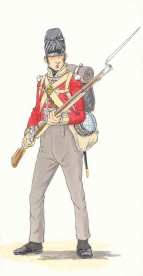
14e (Buckinghamshire Regiment)
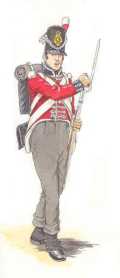
4th (King's
own) Rgt of Foot
|
|
| |
A partir de 1812, l’infanterie
anglaise adopte un nouveau type de shako, emprunté au troupes portugaises.
Il se caractérise par un fronton de feutre bordé d’un galon noir,
orné d’une plaque en laiton. Cette plaque est le plus souvent ornée
du monogramme royal. Certains régiments portaient en plus un badge
ou le chiffre du régiment.
Le pompon est porté sur le côté.
Ce shako est garni d’un cordon blanc tressé terminé par deux glands
qui pendaient à droite. D’après l’iconographie, le shako est le
plus souvent représenté, même en campagne, orné du plumet et des
cordons. Certains régiments faisaient usage en campagne d’un
couvre-shako de toile cirée noire. En 1815, le 28e régiment avait
conservé le stove-pipe schako. Ce régiment portait une petite
plaque à l’arrière du shako. |
|
|
|
| |
En campagne, les régiments d’infanterie
portaient des pantalons de drap gris par dessus des demi-guêtres
noires
Un ordre de 1808 imposa aux régiments de peindre les havresacs en
noir, avec le numéro du régiment peint en blanc. Auparavant ils
étaient peints en ocre ou en brun, portant le numéro du régiment
ou son attribut peint sur un rond de la couleur distinctive. Néanmoins,
on trouve dans l’iconographie que certains régiments portaient encore
en 1815 des badges peints sur le havresac.
|
|
|
|
| |
|
|
|
|
|
|
|
|
| |
|
|
|
|
| |
|
|
|
|
_ Retour
au haut de la page.
|
![]()
